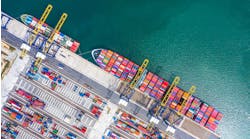The state of logistics and the race for capacity (both in transportation and warehousing) was a key focus. But some of our participants contended that efficient logistics is more an issue of utilization than capacity. Ron Giuntini suggested an interesting way to approach this problem: Change the model from one where capital goods are sold to where they are “enrobed in a service” (i.e. , shared in the cloud). This is called "fractional ownership,” in which the end-user of assets like a truck or even a jet fleet has part-ownership and engages in “pay-per-access.” This affords them a fixed cost per frequency of use and therefore a fixed cost per unit-of-use.
Tan Miller of Ryder University’s Global Supply Chain program talked about decision support systems and the need for better supply chain analytics. He contends this art and science has been undervalued but is now the focus of more attention and investment. This explains why “Big Data” is big in logistics—and could even help facilitate the vision Giuntini described.
The synchronization of data flow and physical flow is the ultimate logistics challenge and the key to true supply chain visibility. It’s why Uber, the on-demand car service, is now going beyond the core concept of passenger transportation to package delivery in some cities. This service may become an all-purpose utility, as Giuntini discussed.
Continued pg 2
We also talked about other modes like rail, which is entering a new age of development. Ann Christopher, our newest board member, who happens to be general counsel for Kenco Group, talked about the opportunities for shippers if they focus more on contractual language in their relationships with 3PLs. That becomes even more important as 3PLs take on more intermodal services like arranging for the shipment of containers by rail over long distances, in addition to truck and ocean transport. Some 3PLs operate their own trucks or warehouses, while others function as pure intermediaries between shippers and underlying asset providers. Knowing who is responsible for what and where liabilities fall get more important as these relationships and services become more complex.
What you’ll take away from our September Roundtable report—and subsequent one-on-one videos that came out of this event—is that supply chain professionals (like you) need to evolve from cost-savers to value creators and strategists.
Follow #MHLLive on twitter, or check back here to find out what else happened at the MHL Roundtable - LIVE.




